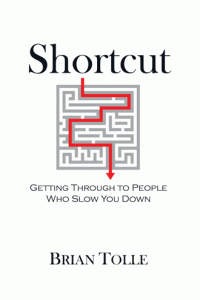 As a community manager, your most important task is not managing content or technical systems. It’s managing people and the flow of demands, questions, personalities and quirks that all people bring to your world.
As a community manager, your most important task is not managing content or technical systems. It’s managing people and the flow of demands, questions, personalities and quirks that all people bring to your world.
I interviewed Brian Tolle, partner at The Re-Wired Group and author of Shortcut: How To Get Through to People Who Slow You Down, to ask him for some guidance on working with others. The interview questions were not specifically about social media and community managers, but I think you’ll recognize some insights into how people work in communities.
The basics are these: there are a few personality types in your community. Each personality type has a very specific way of working in a team, on projects, and in the general online and offline environments. Tolle uses a very specific methodology to interview each of these types on how they work and then uses those interviews to present ways you can use to leverage the most efficiency and results out of each.
Douglas Crets: When one first opens your book, the immediate thinking might be that communication alone can solve all workplace problems, but it appears that it’s not just communication that helps the work environment. Can you explain why just talking things out with someone isn’t enough? A lot of built-in HR and internal consulting basically falls to this default “talk it out” setting.
Brian Tolle: Where I have seen increased awareness and application of these styles (talking things out) come up short in improving interpersonal relationships and teamwork is where there are conflicting priorities and/or values among the team members or between the two individuals. And because so much personal identity and emotions are tied up with one’s priorities and values, there are situations where a communication impasse remains. That’s when a higher order of “talking it out” is required and it usually involves some form of negotiation (see Fisher & Ury’s classic Getting to Yes for more on their “principled negotiation” as an example of the next order up of communication clarity). Without some version of negotiation, what I have seen is that, depending on the rigidity of each person’s stand, the only way to break the impasse is through the decision of someone in authority. It’s quick but not long lasting. The “agreement” reached usually falls apart fairly quickly from both parties.
What is the immediate and then long-term incentive for people to read your studies of how different workplace personalities interact and inhibit each other’s sense of progress? Will we make more money this way? Is it a pathway to more innovation? Career success?
So it’s the core question: What’s in it for me to invest in trying this stuff out? Here are the answers I share in my workshops:
- Increased time efficiency (and decrease in related stress). How many of you have had the same conversation with the same person more than once? Not the best use of your time the third or fourth time around. How much stress is generated with each round of poor communication? Are you speaking their language from the very start?
- Greater likelihood for innovation and creativity. Ideas get shared, explored, and considered when there are open lines of communication present. This includes both offering and soliciting ideas.
- Decrease in “churning”, or that sense that one is working really hard and not making the commensurate progress.
- Achieving results that stick. How many times do we think we got agreement in a meeting, only to find out later that the attendees are pursuing different agendas?
Speaking more broadly, what do you think it is about corporate culture or our culture in general that makes people feel comfortable with approaching work and solutions only through their own personality? I get the sense that the answer to this question is not as obvious as it appears.
What I have seen is that people, as individual contributors in organizations, are rewarded (praise, promotions, etc.) for getting things done and the way they get things done is their preferred way of doing things, which gets reinforced through these rewards. This is fine until they rise high enough in an organization where he/she needs to get things done through others and those others have a diversity of preferred ways of doing things. That’s when he/she needs some guide through the “mystery” of human communication
Tolle is a management consultant at the Re-Wired Group in Ann Arbor, Mich., and specializes in team dynamics, change management, and collaboration. He just wrote a book called Shortcut: Getting Through to People Who Slow You Down. You can probably finish it in two commutes to and from work, if not sooner.
Disclosure: Douglas Crets is Community Manager for the Re-Wired group and you can follow him on Twitter.



Each Entrepreneur is faced with an endless tasks that need to be done each day. Each tasks seems to be more important when compared to other task on the list.
Â
In our office, We are using employee time recording software from Replicon ( http://goo.gl/yGF1mm ) to manage our time and projects. Using this software, we can decide the priority tasks that wants to complete first. The best way to complete the big project is to divide the project into individual tasks and then break down each task into smaller tasks.